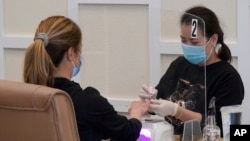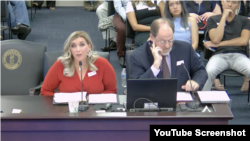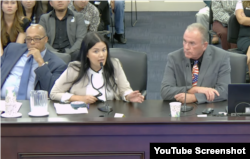Kentucky lawmakers are poised to take up a fight on behalf of Asian-American nail technicians and salon owners, who claim barriers to working in the industry are too high, and accuse the state’s Board of Cosmetology of biased policies and practices.
“It's hard for us to find independent, licensed nail contractors to work,” said Molida Soth, a Cambodian-American who runs a nail salon in Frankfort, Kentucky, with her sister Ponya Soth.
The sisters are part of a push to allow aspiring nail techs to take the state’s licensing test in their native language, to reduce penalties for failing the test multiple times, and to allow salons to appeal decisions — such as closing businesses — handed down by the Kentucky Board of Cosmetology.
“We’re not trying to change the standard of the exam or make the exam any easier, but just to make it more accessible for people who speak English as their second language,” Molida Soth recently told VOA Khmer.
Kentucky’s general assembly will return to session in early January. Sen. Reggie Thomas, a Democrat, plans to introduce a bill that includes a number of those reform proposals put forth by the group of mostly Vietnamese and Cambodian nail industry representatives.
Thomas said the final text was still being worked out, but noted he has already received the co-sponsorship of Republican state Sen. John Schickel, who chairs the chamber’s Licensing and Occupations Committee.
“We will continue to pursue this and hopefully bring this to the Senate floor and the House in 2024. That's my objective, to see change made,” Thomas told VOA Khmer in November.
He said the bill may also give industry representatives a seat on the Board of Cosmetology, increasing their voice in how businesses are regulated.
That move follows a contentious hearing of the state’s Commission on Race & Access to Opportunity in September, during which Julie Campbell, the executive director of the state’s cosmetology board, pushed back on a number of those recommendations.
She said the state is not “equipped” or “financially able” to provide the test in non-English languages, though she also said the board had only recently received the proposal and was open to further discussions about it.
In a letter to state senator Thomas in November, Board of Cosmetology Chair Margaret Meredith said the board was open to allowing exams in languages currently available through its testing vendor, PSI. Those include Chinese, Vietnamese, Spanish, Portuguese, and Korean.
Molida Soth said PSI told her it could create exams in new languages if requested by states. PSI did not respond to a request for comment from VOA Khmer.
Campbell claimed during the hearing that almost all nail salons are using unsafe products, showed images of deformed fingers from customers in other states, and said the board had never revoked a license from a business that didn’t have a “torrid past.”
She also showed a photograph of an allegedly unlicensed Asian nail tech providing services — drawing a rebuke from state Sen. Whitney Westerfield, a Republican.
“I'm insulted and offended that you'd use a photograph of someone that is subject to a complaint in this forum in that way,” Westerfield said at the hearing.
Westerfield told VOA Khmer he was inclined to support the bill, assuming it reflected the requests being made in the hearing. He said the board’s arguments for not making the test accessible in various languages “came across pretty weak sauce to me.”
“I frankly thought the Board did themselves absolutely no favors with the entire presentation,” he said.
Among the slides shown by Campbell and the board’s general counsel, Christopher Hunt, was a pie chart showing that only 22 out of thousands of salons in the state had been closed down in the past year.
They also showed the pass rates of different tests. In 2020-21, the pass rate for nail techs was 46 percent. That was up almost 10 points from two years earlier, but well below the 77 pass rate for cosmetology test takers.
Westerfield suggested that was because many of those taking the nail tech test were Asian immigrants, while many of those taking the cosmetology test were native English speakers.
“I think that language barrier could probably be a part of that,” he said.
Hunt said the board was open to suggestions on how to address the issue.
“I think one suggestion may be to see if they could take the exam of the languages they speak,” said Sen. Karen Berg, a Democrat. “That might address your pass-fail rate.”
One of the changes advocates are pushing for would lift a current rule that bans test takers from retaking the test for six months after three failures, and three years after five failures.
In its Nov. 9 letter to Thomas, the board said it “might be able” to support removing these limitations, but would still require applicants to take a “80-hour refresh course” before being eligible for retakes after three failures. However, it opposed another measure that would cap exam fees at $35, saying the vendor was charging the state $82 per test.
The industry advocates also claim that Asian-owned nail salons are disproportionately targeted for enforcement actions, and have accused agency inspectors of rude and sometimes racist behavior toward Asian-American business owners.
Lianna Nguyen, a Vietnamese-American owner of a nail salon school, has been part of the push with the Soth sisters. She claimed Campbell “wants minorities to be kept out of the industry,’’ adding, “She wants to make it difficult.”
Nguyen claimed that some Asian nail techs were having a harder time transferring their credentials from other states. And she said board inspector Jason Back, a former police officer, regularly bullies salon owners. She posted a video on social media showing Back apparently threatening to shoot a dog at one Asian-owned salon.
Hunt, the Board counsel, flatly denied these claims in an email to VOA Khmer.
“It is further noted that Ms. Nguyen has very publicly and deliberately made these allegations without any supporting evidence,” he said of the racism claims toward Campbell. “Ms. Nguyen has provided no evidence to support her defamatory statements because none exists.”
Hunt added that the Board has seen no evidence of Back “bullying” salon owners, but that a matter involving a dog was still pending an administrative hearing. “For this reason, the Board has no comment,” he wrote.
Nguyen said she was happy that someone was finally listening to their complaints, but added she does not expect Campbell to jump on board with the reform efforts.
“I feel like if she's still in office, when we're trying to pass the bill, she's going to do everything she can to fight for this bill not to happen and I don't believe that we should have that type of leader,” she said.
Molida and Ponya Soth said the stakes are high for fellow immigrants who just want the security of a job, and salon owners who are struggling to find enough staff to meet demand.
“We should just give people opportunity,” Molida said.







